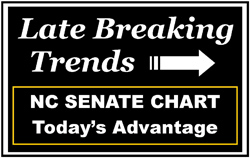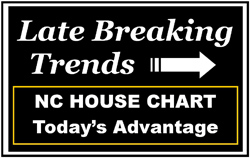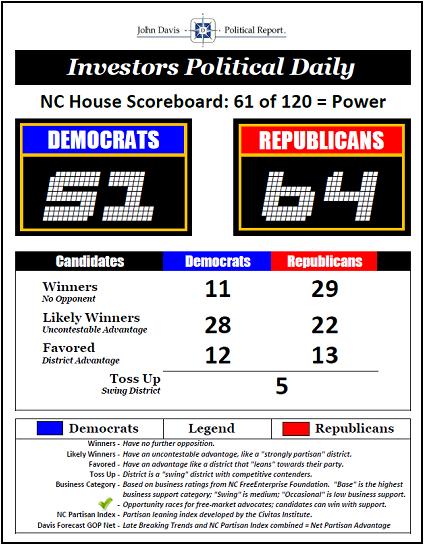[audio:https://www.johndavisconsulting.com/wp-content/uploads/2011/03/Audio-March-3-Pop-Growth.mp3|titles=Audio March 3 Pop Growth] “If they [Republicans in Congress] focus only on austerity and neglect to offer a pro-growth message, their attempt to tame the budget will be of limited appeal and could prove to be their undoing.” Karl Rove, Wall Street Journal, March 3, 2011 Political Implications of NC’s 84% Voter Population Growth
[More…]
| [audio:https://www.johndavisconsulting.com/wp-content/uploads/2011/03/Audio-March-3-Pop-Growth.mp3|titles=Audio March 3 Pop Growth] |
“If they [Republicans in Congress] focus only on austerity and neglect to offer a pro-growth message, their attempt to tame the budget will be of limited appeal and could prove to be their undoing.” Karl Rove, Wall Street Journal, March 3, 2011
Political Implications of NC’s 84% Voter Population Growth Since 1990
Granted, yesterday’s big news that North Carolina’s population has grown 18.5% in one decade is something to write about. However, in order to see just how dramatically we have changed politically you should take a look at the 84% growth in registered voters since 1990.
The 84% growth in registered voters since 1990 has yielded confounding results: the political market share of Democrats has declined by 30%, yet we have twice as many liberals. There are a million more Republicans, yet the market share of conservatives has declined by 20%.
Caution: The greatest political challenge ahead for the new GOP legislative majority is how to initiate conservative solutions to state government problems without alienating the majority of voters who prefer results over party or ideology … voters who are more likely to say that they are “liberal” (17.6%) or “moderate” (37.3%) than “conservative” (41.4%).[i]
Voter population growth yields fewer Democrats: In 1990, there were 3.3 million voters in North Carolina. As of February 26, 2011, there are 6.1 million voters … an 84% increase.
- In 1990,[ii] 64% of NC registered voters were Democrats
- Today, only 45% of registered voters are Democrats (30% decline)
- In 1990, 31% of NC registered voters were Republicans
- Today, the Republican share 32% (no change)
- In 1990, 6% of NC registered voters were “Unaffiliated”
- Today, the “Unaffiliated” registration is 24% (a 400% increase)
Half of NC’s Voters are in 14 Urban Counties
The geography of North Carolina is unchanged. The mountains are still standing where they stood in 1587 when the “Lost Colony” of British immigrants first settled on Roanoke Island. The ocean waves still wash ashore along the coast just like they did in 1781 when North Carolina patriot militiamen defeated Cornwallis at the Battle of Guilford Courthouse during the Revolutionary War. It’s the profile of the people who make up modern day North Carolina that has undergone profound change … change driven by dramatic population growth in the last few decades.
Throughout most of our history, we were a Southern state … rural and conservative. Today, we are more diverse … more like the nation than the South; more urban and ideologically moderate.
Today, half of North Carolina’s 6.1 million voters reside in 14 counties; the other half reside in the other 86 counties. That means that once the new legislative maps are drawn, half of the state Senators and House members will be from 14 counties, the other half from the other 86 counties.
Non-Southern Newcomers Remix Liberals, Moderates, and Conservatives
As to the ideological shift, according to polling and democratic research conducted throughout the past two decades, two-thirds of the newcomers to North Carolina are not from the South. The leading states sending new voters to North Carolina are Pennsylvania, California, Florida, New York, New Jersey and Ohio. Although these new voters have caused the 30% decline in the number of registered Democrats, their predominantly progressive political ideology has led to a doubling of self-described liberals.
Since the early 1990s, while serving as President of NCFREE, I asked the following question in all statewide polls: “For most government policies do you prefer the solutions offered by liberals, moderates, or conservatives?” (If Liberal, ask …) “Would that be very liberal or just liberal?” (If conservative, ask …) “Would that be very conservative or just conservative?”
Prior to 1995, the total “Liberal” was always a single digit number in statewide public opinion polls. In 1995, the total “Liberal” increased to 10.3% (“Liberal” 8.8%; “Very Liberal” 1.5%).[i]
Today, polls show the total self-described liberals in North Carolina consistently closer to 20%, with conservatives around 45% and moderates around 35%.
According to Tom Jensen with Public Policy Polling, their latest North Carolina poll shows 16% of our voters describing themselves as liberal, 40% moderate, and 44% conservative. (For emphasis: 56% NOT claiming to be conservative … in a Republican-friendly year!)
A new study released this week by Gallup shows that based on tracking polls throughout 2010 North Carolina is 41.4% conservative, 37.3% moderate and 17.6% liberal. Only two Southern states are more liberal and less conservative than North Carolina: Florida and Virginia. It’s no coincidence that those three states are the only Southern states carried by President Obama.
Although liberals and moderates combined are already well over half of all voters, their share of voters in urban areas increases considerably. Restated for emphasis: Half of all voters in North Carolina’s 100 counties live in 14 urban counties. These 14 counties were carried by the Obama/Biden ticket with 1,027,114 votes to only 692,939 for the GOP McCain/Palin ticket.
Conservative Governance of a Moderate, Battleground State
As stated at the outset, the greatest political challenge ahead for the new GOP legislative majority is how to initiate conservative solutions to state government problems without alienating the majority of voters who prefer results over party or ideology … voters who are more likely to say that they are “liberal” or “moderate” than “conservative”.[i]
Karl Rove writes in today’s Wall Street Journal, “If they [Republicans in Congress] focus only on austerity and neglect to offer a pro-growth message, their attempt to tame the budget will be of limited appeal and could prove to be their undoing.” Rove concludes, “Americans today want to know what steps Republicans will take to create more jobs, bigger paychecks and greater prosperity.”
There you have it. The way to meet the challenge of governing as a conservative in a moderate state is to stay keenly focused on what North Carolinians want … the same thing all Americans want, “more jobs, bigger paychecks and greater prosperity.”
– END –
[i] NCFREE statewide survey of 800 registered voters in North Carolina conducted between the dates of February 27 – March 3, 1995. The survey is based upon actual telephone interviews with registered voters.
[ii] http://www.gallup.com/poll/125066/State-States.aspx
[iii] http://www.gallup.com/poll/125066/State-States.aspx
[iv] 1990 voter registration numbers are from the State Board of Elections. My sincere thanks to Jacque Blaeske who took the time to find them and send them to me.
– END –
Please subscribe to the John Davis Political Report for the 2011-2012 election cycle. The Premium subscription is $485 a year. Subscribe online today at www.johndavisconsulting.com/subscribe.
The Advantage subscription is $4,850 per year. This subscription covers the John Davis Political Report with unlimited distribution rights to your employees or trade association members, along with private political briefings for you, your employees and leadership team, all conducted personally by me at your offices or conference locations.
Subscribe today at www.johndavisconsulting.com/subscribe.
Sincerely,
John N. Davis, President
Click the Play Button Below for an Audio Summary [audio:https://www.johndavisconsulting.com/wp-content/uploads/2011/02/JDPR-2-22-2011-Charlotte-Host-DNC.mp3|titles=JDPR 2 22 2011 Charlotte Host DNC] “NC’s long-term industrial transformation — from tobacco, textiles, and furniture to research, energy, and banking — plays into what may be the centerpiece of the Democrat’s reelection bid, a call for the U.S. to focus on innovation to compete
[More…]
| Click the Play Button Below for an Audio Summary |
| [audio:https://www.johndavisconsulting.com/wp-content/uploads/2011/02/JDPR-2-22-2011-Charlotte-Host-DNC.mp3|titles=JDPR 2 22 2011 Charlotte Host DNC] |
“NC’s long-term industrial transformation — from tobacco, textiles, and furniture to research, energy, and banking — plays into what may be the centerpiece of the Democrat’s reelection bid, a call for the U.S. to focus on innovation to compete in the changing global marketplace.” Associated Press, February 2, 2011
A Model of Innovation and Global Competitiveness … or Algorithmic Voodoo?
A headline in the Wall Street Journal, Feb. 2, 2011, read, “Democrats’ 2012 Convention Plan Aims to Keep North Carolina Blue.” The story suggested that Charlotte was selected to host the DNC’s national convention in order to send a signal to the political community that President Obama’s target map is not shrinking. The President’s campaign team wants to show that they are confident of repeat wins in historically red states like North Carolina, Indiana and Virginia.
That’s all well and good, but I believe that there is an even more important reason for choosing Charlotte: North 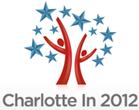 Carolina. It’s not just Charlotte, it’s our state. Our state represents Obama’s vision of the new model when it comes to innovation and global competitiveness. North Carolina may have been “First in Flight” in the 20th Century, but our growing reputation in the 21st Century is “First in Innovation,” an outgrowth of being “First in Business.”
Carolina. It’s not just Charlotte, it’s our state. Our state represents Obama’s vision of the new model when it comes to innovation and global competitiveness. North Carolina may have been “First in Flight” in the 20th Century, but our growing reputation in the 21st Century is “First in Innovation,” an outgrowth of being “First in Business.”
From Forbes to Site Selection magazine, North Carolina has been recognized as having the “Best Business Climate” year after year for a decade. Democrats beam with pride when they see those national awards of distinction handed to our state. However, Republicans act as if the criteria for identifying our exceptional competitive qualities are based on algorithmic voodoo.
What’s a Republican to Do?
What is a Republican to do? Last fall, North Carolina voters elected Republicans to shore up the long-term prospects of maintaining the state’s favorable business climate by restoring financial health and efficient delivery of governmental services. Those two qualities, financial health and efficient delivery of services, have fallen by the wayside due to unilateral state budget power over too long a period of time by those who put the Democratic Party ahead of the fiscal integrity of the state and the character of its leaders.
Voters are now counting on Republicans to take ownership of our state’s business climate, and to stake a claim for a fair share of all things positive in our state … including the positive qualities like our model business climate that led to the selection of our state as the host state for the Democratic National Convention.
Sharing the Credit for a Business Climate that is the Envy of the Nation
So, before you GOPers start grousing over the positive commentary on the selection of Charlotte for the DNC national confab in 2012, please remember that the mayor of Charlotte during most of the dynamic growth since 1995 was a Republican named Pat McCrory.
Over the past four decades, millions of Republican business leaders and Republican employees have helped build great companies and communities in North Carolina. They, right along with Democratic business leaders and Democratic employees … and Independent business leaders and Independent employees … helped make our state’s business climate the envy of the nation.
Take a look at the lists of high praise below and give some thought about whether these honors would have come to North Carolina without the hard work and good successes of all of us.
North Carolina’s Business Climate – The Envy of the Nation in 2010
- No. 1 Best Business Climate 9 of the last 10 years, Site Selection magazine, November
- No. 2 Best State for Business by CEO’s, Chief Executive magazine, May/June
- No. 3 Best State for Business, Forbes, October
- No. 3 State for In-migration, United Van Lines Migration Study
- No. 4 America’s Top States for Business survey, CNBC, July
- No. 5 Pro-Business State, Pollina Corporate Real Estate
- No. 7 Best-Performing City: Raleigh-Cary area, Milken Institute, October
- Raleigh, Charlotte and Durham Forbes list of Best Places for Business and Careers
North Carolina’s Business Climate – The Envy of the Nation in 2009
- No. 1 Best Business Climate 8 of the last 9 years, Site Selection magazine, November
- No. 2 Most Competitive State, Site Selection, May
- No. 2 Best State for Business by CEOs, Chief Executive magazine, February
- No. 3 Pro-Business State, Pollina Corporate Real Estate, June
- No. 5, Forbes Best States for Business, September
- No. 8, Top States for Nanotechnology, August, 2009 (Raleigh No. 4 for Nano Metros)
- No. 9, America’s Top States for Business study, CNBC, July (No. 2 for Workforce)
- Next Cities list of 60 U.S. Hotspots for Young, Talented Workers : Charlotte under “Super Cities”; Durham under “Midsize Magnets”; Cary under “Mighty Micros.”
- 4 N.C. cities on CNNMoney.com best places for small business startups, Oct. 13
- Best Places for Business and Careers: No. 1 Raleigh, No. 3 Durham, No. 6 Asheville, No. 13 Wilmington, No. 18 Winston-Salem and No. 19 Charlotte (in the “Best Metros” category); and No. 2 Greenville (in the “Best Small Metros” category), Forbes, March
North Carolina’s Business Climate – The Envy of the Nation in 2008
- No. 1 Best Business Climate 7 of last 8 years, Site Selection magazine, November
- No. 1 State with Small Metropolitan Areas Having the Most New and Expanded Corporate Facilities, Site Selection magazine, March
- No. 1 Pro Business State, Pollina Corporate Real Estate, Inc. study
- No. 2 Best Business Climate, Development Counselors International (DCI), July
- No. 3 Most Competitive State, Site Selection, May
- No. 3 Largest Biotech Industry of U.S. States, Beyond Borders, Ernst & Young
- No. 4 for Biotech Strength in Drugs and Pharmaceuticals, Business Facilities, July
- No. 4 Best State for Business, Forbes magazine, July
- No. 6 America’s Top States for Business study, CNBC, July
NC’s Industrial Transformation, the Centerpiece of the Democrats’ Re-election bid
Today, North Carolinians are younger, smarter, and more urban/suburban than they were 10 years ago according to the U.S. Census Bureau. Our 18.5% growth has also created greater diversity. North Carolinians are just as likely to be from somewhere else USA; our demographic profile is more like the nation than the South. As Ferrel Guillory, Director of The Program on Public Life at UNC Chapel Hill, wrote in his essay North Carolina: she ain’t what she used to be, “The state has transformed from biracial to multi-cultural.” Why? Economic opportunity.
North Carolina is one of the emerging states that best exemplifies the message of change that Obama won on in 2008. That’s the thematic reason we were chosen to host the Democrats next September. Young, smart, diverse … first in innovation, leading the way in economic recovery and business investment.
Granted, the commitment by Duke Energy’s CEO Jim Rogers to raise the necessary $37 million to host the event was a critical factor; and, the fact that Charlotte’s new Democratic Mayor Anthony Foxx is tight with the President helped a bit. Ummmmm, and then there is the prospect of a late-night, one-on-one game with Michael Jordan. But none of that would have mattered if North Carolina had not developed into one of the most dynamic places in the world to live, learn, work, raise a family … and make money; one of a handful of states “leading the comeback from the worst recession since the 1930s,” according to an analysis by USA Today.
Associated Press writer Liz Sidoti said it best in her February 1, 2011 story titled, Dems choose Charlotte for 2012 convention. Sidoti wrote, “With the economy certain to dominate Obama’s re-election bid, North Carolina’s long-term industrial transformation — from tobacco, textiles, and furniture to research, energy, and banking — plays into what may be the centerpiece of the Democrat’s re-election bid, a call for the U.S. to focus on innovation to compete in the changing global marketplace.”
Will Obama Win NC Again? Will the GOP Hold the Legislative Majority?
As the Wall Street Journal story “Democrats’ 2012 Convention Plan Aims to Keep North Carolina Blue” suggested, Charlotte was selected to host the DNC’s national convention to send a signal to the political community that President Obama’s target map is not shrinking.
What are Obama’s prospects for winning North Carolina in 2012? Well, half of all voters in our 100 counties live in 14 urban counties. These 14 counties were carried by the Obama/Biden ticket with 1,027,114 votes to only 692,939 for the GOP presidential ticket of McCain/Palin.
Those 1,027,114 voters who supported Obama/Biden in 2008 still live here, and they are still more likely to support Democrats. It’s an urban thing; same throughout the US.
However, in 2010, independent suburban voters, along with conservative Democrats and loyal Republicans, gave the North Carolina GOP a majority in the state Senate and state House of Representatives. Those voters still live here too.
Whether North Carolinians will give Obama another win in 2012 is uncertain. The more important question is will North Carolinians give Republicans another opportunity to lead the state following the 2012 elections. That is equally uncertain.
What is certain is that Republican odds will improve if they begin to see the state the way everyone else in the country sees North Carolina: youthful and innovative, diverse, leading the way to a globally competitive citizenry … an exemplary state with a business climate that is the envy of the nation … a state fitting for a national political convention.
– END –
Please subscribe to the John Davis Political Report for the 2011-2012 election cycle. The Premium subscription is $485 a year. Subscribe online today at www.johndavisconsulting.com/subscribe.
The Advantage subscription is $4,850 per year. This subscription covers the John Davis Political Report with unlimited distribution rights to your employees or trade association members, along with private political briefings for you, your employees and leadership team, all conducted personally by me at your offices or conference locations.
The Advantage subscription will give you a greater sense of certainty about the politics of 2012 … earlier than anyone else. More specifically, my goal is to give you the advantage that comes from knowing the likely outcome of primary and general election races months in advance in order that you might plan ahead and invest effectively.
Subscribe today at www.johndavisconsulting.com/subscribe.
Sincerely,
John N. Davis, President
“This selection should put to rest any notion that the Presidential map in 2012 is going to shrink.” ABC News story about Charlotte hosting the Democratic National Convention Key Dates in 2012 Candidate Filing opens Feb. 13, 2012; closes Feb. 29th (Leap Year!) Primary Election Day is May 8, 2012 Republican National Convention in Tampa
[More…]
“This selection should put to rest any notion that the Presidential map in 2012 is going to shrink.” ABC News story about Charlotte hosting the Democratic National Convention
Key Dates in 2012
- Candidate Filing opens Feb. 13, 2012; closes Feb. 29th (Leap Year!)
- Primary Election Day is May 8, 2012
- Republican National Convention in Tampa August 27, 2012
- Democratic National Convention in Charlotte September 3, 2012
- General Election Day is November 6, 2012
No political party has a predictable advantage in North Carolina … period.
North Carolina became a presidential battleground state in 2008 with President Obama’s historic win. It continues as a battleground state, despite the GOP takeover of the General Assembly.
Any hope among Republicans that they could gain an early advantage in the 2012 elections by parlaying their exclusive legislative power into unilateral political power has been dashed by the selection of Charlotte as the geographical center of President Obama’s campaign for reelection.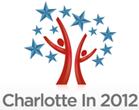
President Obama likes North Carolina. He came here 8 times in 2008 after his nomination in Denver. He vacationed here with his family in 2010. Last month he made a major policy speech at Forsyth Tech. And now, Charlotte has been selected as the host city for the Democratic National Convention.
“This selection should put to rest any notion that the Presidential map in 2012 is going to shrink,” a senior Democratic official told ABC News. “President Obama will be very active in North Carolina and … despite what some have speculated, we are going to go as big in 2012 as we did in 2008 — and that means fighting hard for North Carolina, Virginia and all the states and more that helped elect President Obama in the first place.”
It is precisely because no political party has a predictable advantage in North Carolina that you need to subscribe to the John Davis Political Report.
No one called the legislative races earlier or more accurately last year. I projected the winner in 47 of 47 NC Senate races (3 races were toss ups), and correctly projected the winner in 111 of 115 NC House races (five races were toss ups). Since the last census, I have correctly projected 1100 of 1144 races in North Carolina … thanks in great part to my analysis of the districts.
I do not lobby, so I have no hesitation with writing objectively and boldly about the political mistakes of legislative leaders and the other factors that drive elections.
I do not have a partisan bias. My value as a political analyst and commentator is in having someone other than a party loyalist keeping you informed about the job party leaders are doing and the implications of their actions, good and bad, for election results in 2012.
I am not a political campaign consultant, so I have no conflict of interest in assessing the strengths of candidates and the status of political races.
Maps do not a majority make
New legislative and congressional districts will be mapped this year, with Republicans in charge for the first time since the 19th Century. Although you can count on Republicans to draw lines that favor their interests, there are many political forces far more important than the maps that I will be investigating on your behalf … like the 2012 battlefield leadership teams, the money, the strengths/weaknesses of the candidates and their consultants, President Obama’s decisions, the economy, unity/disunity among party leaders in North Carolina, political blunders, renegade uprisings, third-party organizations, the presidential and gubernatorial races, and the unforeseen local, state, national and international events of the day that always come along and shift the probability of success to one group of candidates over the other.
Democrats have been winning in Republican districts for decades because of the strengths and commitment of their leaders; because they recruited better candidates, raised more money and hired the best political professionals in the nation … and they worked harder, at least up until 2010 when all of those traditional Democratic strengths, including leaders, money, candidates and professionals, were seized by Republicans.
Who will seize the advantages of leadership, money, candidates and professional talent?
In 2010, I made the case that Democrats were less competitive due to events that had nothing to do with Republicans: like a shakeup of key legislative leaders due to retirements; a failed recruitment effort that left 11 Senate Republicans unchallenged and 29 House Republicans unchallenged; the disruption of corruption scandals; the overall dissatisfaction with the direction of the state and nation at a time when Democrats had all of the power; a disillusioned and unenthusiastic base; the loss of independent voters; a loss of confidence in President Obama, and the absence of a major investment in voter registration, turnout and straight-party voting as seen in 2008 when the Obama camp spent $ millions in NC.
Democratic loyalists would not have given you an accurate assessment of their political liabilities in 2010, and Republican loyalists are not going to give you an accurate assessment of their liabilities during the 2011-2012 election cycle.
This is where I come in. The weekly John Davis Political Report for the 2011-2012 election cycle, as well as the partisan momentum tracking in the Late Breaking Trends report, is available to you with the Premium subscription for $485 a year. Subscribe online today at www.johndavisconsulting.com/subscribe.
The Advantage subscription is $4,850 per year. This subscription covers the John Davis Political Report with unlimited distribution rights to your employees or trade association members, along with private political briefings for you, your employees and leadership team, all conducted personally by me at your offices or conference locations.
The Advantage subscription will give you a greater sense of certainty about the politics of 2012 … earlier than anyone else. More specifically, my goal is to give you the advantage that comes from knowing the likely outcome of primary and general election races months in advance in order that you might plan ahead and invest effectively.
Subscribe today at www.johndavisconsulting.com/subscribe.
Sincerely,
John N. Davis, President
– END –
Let me know if you would like for me to speak to your group. Click here to request availability and fees.
Thanks for reading and listening to the John Davis Political Report.
PLEASE URGE YOUR ASSOCIATES TO SUBSCRIBE!
Premium Subscription $485.00 Annual Corporations and Trade Groups
Advantage Subscription $4850.00 Annual Advisory Relationship
Please go to www.johndavisconsulting.com and subscribe.
Post: December 7, 2010 Volume III, No. 2 “I can’t control my caucus anymore.” NC Senate President Pro Tem Marc Basnight, Sited in John Davis Political Report, Volume II, No. 8, December 10, 2009 NOTE: For those of you who are not subscribers, please subscribe today at $485 for the Premium Annual Subscription by clicking
[More…]
Post: December 7, 2010 Volume III, No. 2
“I can’t control my caucus anymore.” NC Senate President Pro Tem Marc Basnight, Sited in John Davis Political Report, Volume II, No. 8, December 10, 2009
NOTE: For those of you who are not subscribers, please subscribe today at $485 for the Premium Annual Subscription by clicking on this link: www.johndavisconsulting.com/subscribe
After selecting the “Sign UP” button, you will be directed to the PayPal site. Look at the bottom of the page for: “No PayPal account? Pay using your credit or debit card.”
Call me if you wish to discuss an advisory relationship 919-696-3859.
If you prefer to process an invoice, click here.
A Political Wave Does Not a Majority Make
Many assert that the Republican “Wave” of 2010 was the reason that North Carolina Republicans won the majority in both chambers of the General Assembly on November 2, a first since 1898. Well, if all it takes is a GOP “Wave,” then why haven’t Republicans won the majority in the North  Carolina General Assembly more often than the one time in 1994 … during a stretch of 112 years? Why is it that only two other states, Oregon and Washington, have an undefeated run of Democratic governors as long as North Carolina?
Carolina General Assembly more often than the one time in 1994 … during a stretch of 112 years? Why is it that only two other states, Oregon and Washington, have an undefeated run of Democratic governors as long as North Carolina?
Sorry, a wave does not a majority make.
The Republican “wave” that swept the U.S. this fall presented a wonderful opportunity for Republicans to achieve historic gains in North Carolina … but nothing more than a wonderful opportunity. Democrats have always been able to beat back the national Republican wave election years because of money, savvy and unity … aided by underfunded Republican candidates and Republican Party disunity.
In 2010, the Republican and Democratic caucus strengths were reversed. It was the Democrats who began to self destruct. Republicans seized that opportunity by doing everything right while the Democrats were doing the most important things wrong.
The potential for Republicans to hold the majority long term has nothing to do with “wave” elections, it is great because they have gotten very good at winning campaigns.
Divided Democratic Leadership Led by Inexperienced War Generals
The NC Senate Democratic Caucus started down the road to defeat on November 17, 2009, a year before the 2010 elections. That was the day Sen. Martin Nesbitt (D-Buncombe) was elected Majority Leader following the abrupt resignation of long-time Majority Leader and Rules Chairman Sen. Tony Rand (D-Cumberland).
Rand was a great war general; Nesbitt was not.
The historic era of unparalleled power of Senate President Pro Tem Marc Basnight came to an end that day. Basnight began to tell his friends, “I can’t control my caucus anymore.” A new era of Senate leadership began, an era led by seasoned urban lawyers with unquestionable public policy credentials … but not political combat credentials.
Marc Basnight and Tony Rand were unquestionably two of the most powerful legislative leaders in state history … powerful because they knew how to win campaigns even during GOP wave years. However, they wielded their power with such ruthless efficiency that over time they made lots of enemies … including in their own caucus. The little known fact outside the Raleigh beltline is that Basnight and Rand were slowly becoming a minority in their majority caucus.
Basnight and his inner circle were business owners. Their fatal flaw was the failure to see the value in maintaining a base of philosophical allies in their caucus by recruiting and helping elect other Democratic business owners.
And so, imperceptibly over time, a liberal coalition of Senate Democrats grew in number and coalesced to create its own force, a mutinous force that became stronger than that of the leaders Basnight and Rand.
Thus, the fall of the Basnight/Rand Empire … and with it, a divided caucus led by inexperienced political war generals. They were doomed a year ago.
United Republican Leadership Led by Seasoned War Generals Who Can Raise Money
By 2008, Senate Republicans and their political team under the leadership of Phil Berger from Eden had become seasoned political combat veterans. They had become so good that they would have won a majority of seats in the North Carolina Senate, during one of the worst years for Republicans in modern political history, if it were not for the unity, savvy and especially the fundraising prowess of the Basnight/Rand political machine.
Senate Democrats were forced to spend an average of $500,000 per competitive race just to fend off Republicans who spent a third of that. That’s how effective Republican leaders, their political staff and their consultants had become at winning campaigns. They were a serious political threat even during a Democratic “Wave” … long before the GOP wave came along.
Among House Republicans, a strong political war general was needed. In 2010, that leader emerged in the name of Thom Tillis, a two-term member of the House from Huntersville. Tillis joined Skip Stam from Apex in what has become a powerful force with a working relationship that has the long-term potential equal to that of Basnight and Rand. They are competent, intelligent, politically savvy, and committed to the state … with a priority of restoring the state’s economic vitality. Oh, and they can raise money!
“We went in united, we came out united.”
Most importantly, Stam and Tillis are united.
I asked a House member to tell me about the Republican House Caucus meeting held a couple of weeks ago during which Skip Stam and Thom Tillis vied against each other for the position of Speaker. That member said, “We went in united, we came out united … thanks to the way Skip Stam and Thom Tillis conducted themselves.” That speaks well for long-term majority status for Republicans in the North Carolina House.
And speaking of the importance of unity and political warfare experience, the role played by NC GOP Party Chair Tom Fetzer in 2009 and 2010 cannot be overstated. A party with a history of being divided, conservative versus moderates, came together under the leadership of Fetzer. Fetzer not only brought unity to the GOP this election cycle, he brought political savvy and fundraising skills from his years as Mayor of Raleigh and as a political consultant.
Fetzer’s rallying theme for the 2010 elections: “One Team, One Goal, Victory.” Unity, savvy and successful fundraising is why Republicans won in 2010. Otherwise, 2010 would have been just another Republican “wave” year written off as a just another missed opportunity.
Don’t Dismiss the Significance of the GOP Commitment
To suggest that “the wave” alone would have carried the GOP into power in 2010 not only flies in the face of NC history, it dismisses the significance of the GOP commitment.
- It dismisses the significance of a leave-it-all-on-the-battlefield 18-month commitment of time and energy by an atypically savvy and united group of NC Republican party leaders and their exceptional staff;
- It dismisses the significance of an atypically savvy and united Senate and House Republican caucus leadership team and their exceptional political staff;
- It dismisses the definitive value of the thousands of volunteers who manned the phone banks for months making 2 million calls so they would not be beat this year in the early voting turnout;
- It dismisses the extraordinary class of candidates who neglected their families and risked their personal resources while working the campaign trail to exhaustion day after week after month after month … nights and weekends;
- It dismisses the significance of thousands of new contributors to Republican candidates and the hard work of those who took the time to work the phones raising the money;
- It dismisses the significance of new independent expenditure groups that followed the 2008 labor union play book with a partisan investment of millions;
- It dismisses the significance of the fact that through mid-October, Republican fundraising was UP twice as much as in 2008 while Democrats were DOWN $2 million;
- It dismisses the significance of the Tea Partiers and all of those rallies held all over the state … rallies organized by organizations like Americans for Prosperity and Civitas … rallies that would not have happened if it were not for committed and hard-working staff;
- It dismisses the significance of the value of 60 polls made public by organizations like Civitas, Carolina Strategy Group and Public Policy Polling … and groups like the NC FreeEnterprise Foundation who compiled political research for easy access;
- It dismisses the significance of the value of organizations like the John Locke Foundation that was a constant source of misery for Gov. Perdue and the Democratic establishment, keeping them tripped up with their effective investigative reporting and in-your-face news releases;
- It dismisses the significance of the constant drum beat of conservative thought pushed into the public conscience by talk radio, Fox News and a gazillion conservative publications and web sites.
Republicans in other states may have inadvertently won the power because of the national wave. Here in North Carolina, the “wave” was nothing more than an opportunity.
Republicans seized that opportunity by doing everything right while the Democrats were doing the most important things wrong. The potential for Republicans to hold the majority long term has nothing to do with “wave” elections, it is great because they have gotten very good at winning campaigns.
Well, there you have it, the John Davis Political Report for Tuesday, December 7, 2010.
Thanks for reading and listening to the John Davis Political Report.
For those of you who are subscribers, I thank you so much for supporting my work.
For those of you who are not subscribers, please subscribe today at $485 for the Premium Subscription, or $4,850 for the Advantage Subscription that includes an advisory relationship.
“As a former member of the North Carolina House, Senate and Executive Branch of North Carolina government, I would not want to be without the John Davis Political Report – a must for those that love the political arena and our state!” Glenn Jernigan, Glenn Jernigan & Associates
“I am frequently asked to identify the brightest political mind in North Carolina. Even before his amazingly accurate and perceptive views on the historic 2010 election, I always responded, “JOHN DAVIS.” Now I doubt anyone will have to ask me because John’s political forecasting, along with his rationale, received widespread attention every day during the final months of the campaign.” Phil Kirk, President/CEO Emeritus, North Carolina Chamber; Chairman Emeritus, State Board of Education; Director, Brady Energy Services
“John Davis has one of the best political minds in North Carolina. He is practically a walking encyclopedia on legislative politics. I have long relied on his wisdom and insights in my own reporting. If you want to keep up with legislature, particularly now that the Republicans are in control, John Davis is the go-to-guy.” Rob Christensen, chief political reporter, The News and Observer and author of The Paradox of Tar Heel Politics
“Just straight up, fact-based, analysis.” Richard H. Moore, Treasurer, North Carolina, 2000 – 2008
“John Davis was right, he was early, and he made the bold calls publicly with political evidence. There was no need for a crystal ball; he simply used history, common sense and solid political science. He called the legislative ‘flip’ to GOP control earlier than any other analyst.” Bill Weatherspoon, American Petroleum Institute, Raleigh, North Carolina
– END –
Let me know if you would like for me to speak to your group. Click here to request availability and fees.
Thanks for reading and listening to the John Davis Political Report.
PLEASE URGE YOUR ASSOCIATES TO SUBSCRIBE!
Premium Subscription $485.00 Annual Corporations and Trade Groups
Advantage Subscription $4850.00 Annual Advisory Relationship
Please go to www.johndavisconsulting.com and subscribe.

